lecture 9英语专业语法
- 格式:ppt
- 大小:403.00 KB
- 文档页数:16
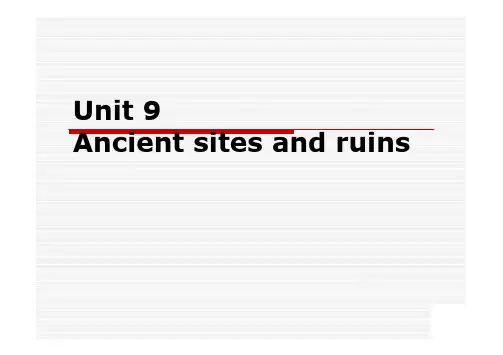
Unit 9Teaching Contentso Get to know how to help tourists with the chek-in procedureo Master some important vocabulary & useful expressions used in the hotelo Simulate the real situation at the hotel and conduct a dialogue with receptionist as a tour guideo Be familiar with the most famous ancient sites and ruins in China导游员的A.S.K.原则—A.S.K.,其中A代表attitude, 即好的工作态度。
要做到心中有数,时刻以游客的利益为先。
当你在带团时,要不停提醒自己:游客是在度假,而自己是在工作,工作时不能有任何松懈。
S代表skill,是指导游员需要有过硬的专业技能,并且对旅行社的各项业务都要熟悉。
这样不仅有利于团队合作,对自己的工作也会大有帮助。
K代表knowledge,也就是说,具备丰富的知识是做一名优秀导游的基础。
导游不仅要了解天文地理知识和不同国家的风土人情,还要对国家的相关法律法规有所了解。
各旅行社常用A.S.K.原则来考核本社导游人员。
Briefing on the Working Procedures入住酒店,领队应与地接社导游一起,与总台确认房间数目与类型,与行李员交接行李送房事项,为团队办理入住手续,并通知总台安排好叫醒电话和早餐。
办好入住手续后,领队要与总台确定用餐的时间和地点,并告诉游客。
酒店大多提供各类设施与服务方便房客使用,领队应协助地陪向游客详细介绍开放时间和收费情况。
如游客在要求送餐,洗衣等服务时遇到语言障碍,领队要帮助他们联系、落实。
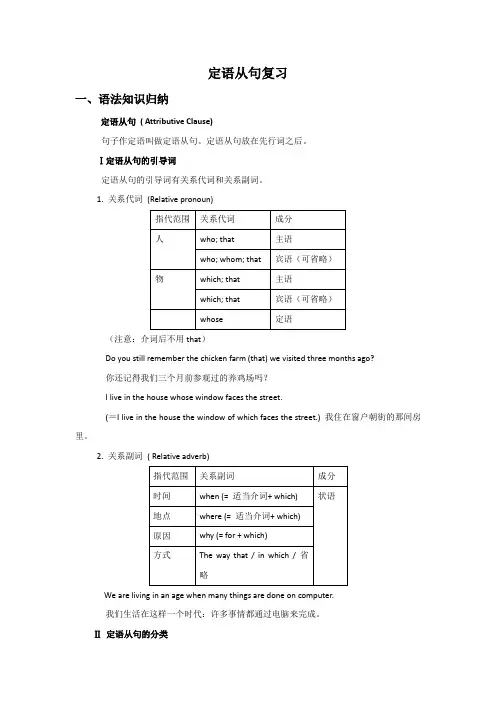
定语从句复习一、语法知识归纳定语从句( Attributive Clause)句子作定语叫做定语从句。
定语从句放在先行词之后。
Ⅰ定语从句的引导词定语从句的引导词有关系代词和关系副词。
1. 关系代词(Relative pronoun)(注意:介词后不用that)Do you still remember the chicken farm (that) we visited three months ago?你还记得我们三个月前参观过的养鸡场吗?I live in the house whose window faces the street.(=I live in the house the window of which faces the street.) 我住在窗户朝街的那间房里。
2. 关系副词( Relative adverb)We are living in an age when many things are done on computer.我们生活在这样一个时代:许多事情都通过电脑来完成。
Ⅱ定语从句的分类定语从句分为限制性定语从句和非限制性定语从句。
限制性定语从句(一)限制性定语从句的基本特征限制性定语从句对被修饰的先行词有限定制约作用,使该词的含义更具体,更明确。
限制性定语从句不能被省略,否则句意就不完整。
从句与先行词之间没有逗号。
He has two sons who work in the same company. (Perhaps he has more than two sons.) 他有两个在同一家公司工作的儿子。
(二)限制性定语从句中关系代词的用法1. that, which当先行词指物,并且关系代词在定语从句中充当主语或宾语时,用which/that 引导定语从句。
在限制性定语从句中有些情况下只能用关系代词that,不用which。
(1) 当先行词是不定代词all, much, little, something, everything, anything, nothing, none, the one时。
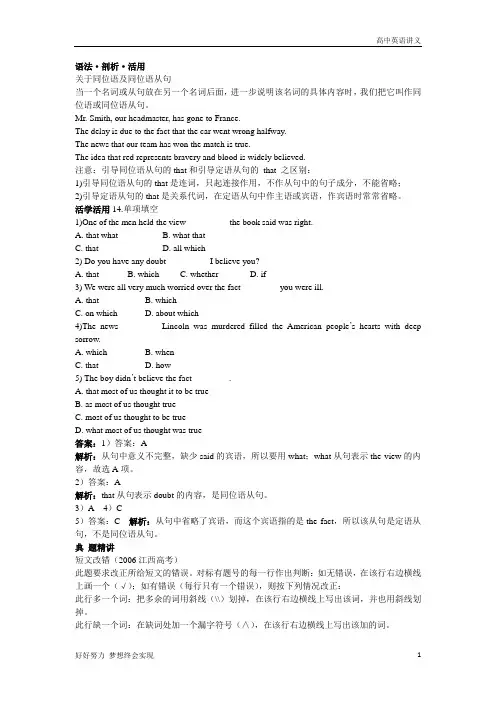
语法·剖析·活用关于同位语及同位语从句当一个名词或从句放在另一个名词后面,进一步说明该名词的具体内容时,我们把它叫作同位语或同位语从句。
Mr. Smith, our headmaster, has gone to France.The delay is due to the fact that the car went wrong halfway.The news that our team has won the match is true.The idea that red represents bravery and blood is widely believed.注意:引导同位语从句的that和引导定语从句的that 之区别:1)引导同位语从句的that是连词,只起连接作用,不作从句中的句子成分,不能省略;2)引导定语从句的that是关系代词,在定语从句中作主语或宾语,作宾语时常常省略。
活学活用14.单项填空1)One of the men held the view _________ the book said was right.A. that whatB. what thatC. thatD. all which2) Do you have any doubt _________ I believe you?A. thatB. whichC. whetherD. if3) We were all very much worried over the fact ________ you were ill.A. thatB. whichC. on whichD. about which4)The news ________ Lincoln was murdered filled the American people’s hearts with deep sorrow.A. whichB. whenC. thatD. how5) The boy didn’t believe the fact ________.A. that most of us thought it to be trueB. as most of us thought trueC. most of us thought to be trueD. what most of us thought was true答案:1)答案:A解析:从句中意义不完整,缺少said的宾语,所以要用what;what从句表示the view的内容,故选A项。
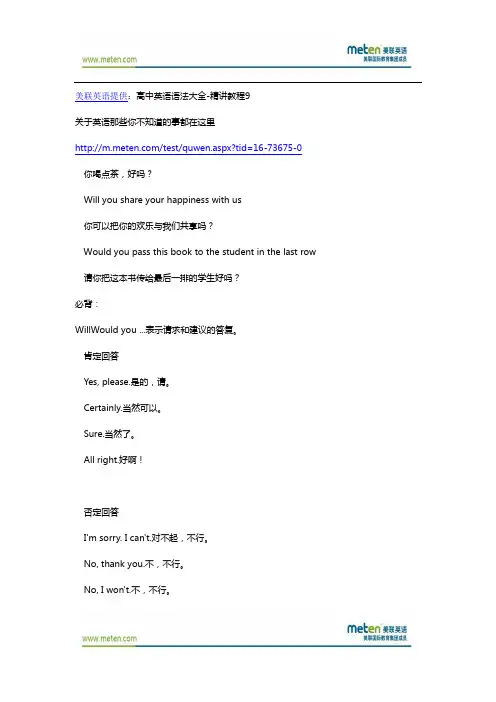
美联英语提供:高中英语语法大全-精讲教程9关于英语那些你不知道的事都在这里/test/quwen.aspx?tid=16-73675-0你喝点茶,好吗?Will you share your happiness with us你可以把你的欢乐与我们共享吗?Would you pass this book to the student in the last row 请你把这本书传给最后一排的学生好吗?必背:WillWould you ...表示请求和建议的答复。
肯定回答Yes, please.是的,请。
Certainly.当然可以。
Sure.当然了。
All right.好啊!否定回答I'm sorry. I can't.对不起,不行。
No, thank you.不,不行。
No, I won't.不,不行。
2.will和would可表示意志、愿望和决心,用于各种人称陈述句。
I will do anything for you.我愿为你做任何事。
I will never tell you the secret.我永远不会告诉你这个秘密。
None is so blind as those who won't see.不愿看的人眼睛最瞎。
They would not let him in because he was poorly dressed.他们不让他进去因为他衣着破旧。
3.will和would可表示某种倾向或习惯性动作。
will表示现在的习惯动作,would表示过去的习惯动作。
He will surf the Internet every night.他每天晚上都在上网。
The boy will sit there hour after hour looking at the traffic go by.那男孩常常坐在那儿好几个钟头,看着车辆行人通过。
He would be nervous when he met strangers.遇见陌生人时他总是很紧张。
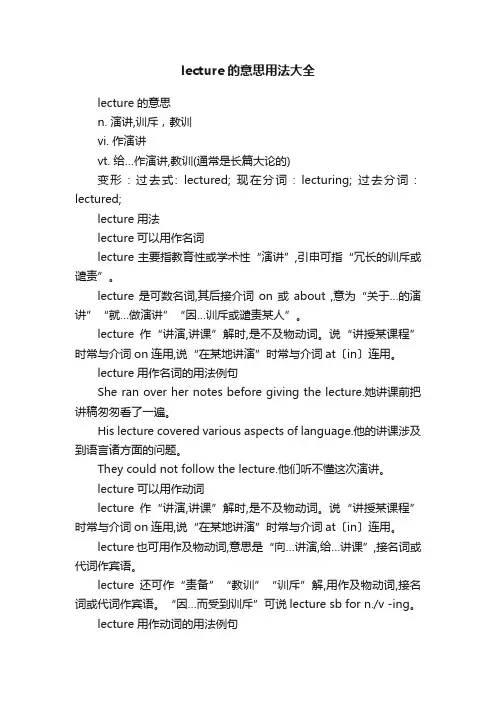
lecture的意思用法大全lecture的意思n. 演讲,训斥,教训vi. 作演讲vt. 给…作演讲,教训(通常是长篇大论的)变形:过去式: lectured; 现在分词:lecturing; 过去分词:lectured;lecture用法lecture可以用作名词lecture主要指教育性或学术性“演讲”,引申可指“冗长的训斥或谴责”。
lecture是可数名词,其后接介词on或about ,意为“关于…的演讲”“就…做演讲”“因…训斥或谴责某人”。
lecture作“讲演,讲课”解时,是不及物动词。
说“讲授某课程”时常与介词on连用,说“在某地讲演”时常与介词at〔in〕连用。
lecture用作名词的用法例句She ran over her notes before giving the lecture.她讲课前把讲稿匆匆看了一遍。
His lecture covered various aspects of language.他的讲课涉及到语言诸方面的问题。
They could not follow the lecture.他们听不懂这次演讲。
lecture可以用作动词lecture作“讲演,讲课”解时,是不及物动词。
说“讲授某课程”时常与介词on连用,说“在某地讲演”时常与介词at〔in〕连用。
lecture也可用作及物动词,意思是“向…讲演,给…讲课”,接名词或代词作宾语。
lecture还可作“责备”“教训”“训斥”解,用作及物动词,接名词或代词作宾语。
“因…而受到训斥”可说lecture sb for n./v -ing。
lecture用作动词的用法例句It was a shame for me to be lectured in front of the whole class.当着整个班级的面被训斥了一顿,真让我感到羞辱。
He lectured to his students on modern writers.他给学生们讲了关于现代作家的一课。

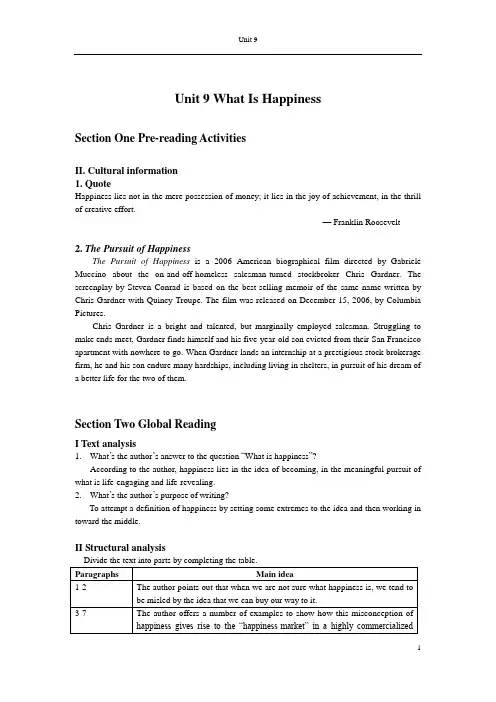
Unit 9 What Is HappinessSection One Pre-reading ActivitiesII. Cultural information1. QuoteHappiness lies not in the mere possession of money; it lies in the joy of achievement, in the thrill of creative effort.— Franklin Roosevelt2. The Pursuit of HappinessThe Pursuit of Happiness is a 2006 American biographical film directed by Gabriele Muccino about the on-and-off-homeless salesman-turned stockbroker Chris Gardner. The screenplay by Steven Conrad is based on the best-selling memoir of the same name written by Chris Gardner with Quincy Troupe. The film was released on December 15, 2006, by Columbia Pictures.Chris Gardner is a bright and talented, but marginally employed salesman. Struggling to make ends meet, Gardner finds himself and his five-year-old son evicted from their San Francisco apartment with nowhere to go. When Gardner lands an internship at a prestigious stock brokerage firm, he and his son endure many hardships, including living in shelters, in pursuit of his dream of a better life for the two of them.Section Two Global ReadingI Text analysis1.What‘s the author‘s answer to the question ―What is happiness‖?According to the author, happiness lies in the idea of becoming, in the meaningful pursuit of what is life-engaging and life-revealing.2.What‘s the author‘s purpose of writing?To attempt a definition of happiness by setting some extremes to the idea and then working in toward the middle.II Structural analysisSection Three Detailed ReadingText IWhat Is Happiness?John Ciardi(abridged)1The right to pursue happiness is issued to Americans with their birth certificates, but no one seems quite sure which way it runs. It may be we are issued a hunting license but offered no game.1Jonathan Swift seemed to think so when he attacked the idea of happiness as “the possession of being well-deceived,” the felicity of being “a fool among knaves.” For Swift saw society as Vanity Fair, the land of false goals.2It is, of course, un-American to think in terms of fools and knaves.2 We do, however, seem to be dedicated to the idea of buying our way to happiness. We shall all have made it to Heaven when we possess enough.33And at the same time the forces of American commercialism are hugely dedicated to making us deliberately unhappy. Advertising is one of our major industries, and advertising exists not to satisfy desires but to create them — and to create them faster than any man’s budget can satisfy them. For that matter, our whole economy is based on a dedicated insatiability. We are taught that to possess is to be happy, and then we are made to want.We are even told it is our duty to want. It was only a few years ago, to cite a single example, that car dealers across the country were flying banners that read "You Auto Buy Now."They were calling upon Americans, as an act approaching patriotism, to buy at once, with money they did not have, automobiles they did not really need, and which they would be required to grow tired of by the time the next year’s models were released.4Or look at any of the women’s magazines. There, as Bernard DeVoto once pointed out, advertising begins as poetry in the front pages and ends as pharmacopoeia and therapy in the back pages. The poetry of the front matter is the dream of perfect beauty. This is the baby skin that must be hers. These, the flawless teeth. This, the perfumed breath she must exhale. This, the sixteen-year-old figure she must display at forty, at fifty, at sixty, and forever.5Once past the vaguely uplifting fiction and feature articles, the reader finds the other face of the dream in the back matter. This is the harness into which Mother must strap herself in order to display that perfect figure. These, the chin straps she must sleep in. This is the salve that restores all, this is her laxative, these are the tablets that melt away fat,these are the hormones of perpetual youth, these are the stockings that hide varicose veins.6Obviously no half-sane person can be completely persuaded4 either by such poetry or by such pharmacopoeia and orthopedics. Yet someone is obviously trying to buy the dream as offered and spending billions every year in the attempt. Clearly the happiness-market is not running out of customers, but what are they trying to buy?7The idea "happiness," to be sure, will not sit still for easy definitions: the best one can do is to try to set some extremes to the idea and then work in toward the middle.5 To think of happiness as acquisitive and competitive will do to set the materialistic extreme.6To think of it as the idea one senses in, say, a holy man of India will do to set the spiritual extreme. That holy man’s ideal of happiness is in needing nothing from outside himself. In wanting nothing, he lacks nothing. He sits immobile, rapt in contemplation, free even of his own body.7Or nearly free of it. If devout admirers bring him food, he eats it; if not, he starves indifferently. Why be concerned? What is physical is an illusion to him.Contemplation is his joy and he achieves it through a fantastically demanding discipline, the accomplishment of which is itself a joy within him.88But, perhaps because I am Western, I doubt such catatonic happiness, as I doubt the dreams of the happiness-market. What is certain is that his way of happiness would be torture to almost any Western man. Yet these extremes will still serve to frame the area within which all of us must find some sort of balance. Thoreau —a creature of both Eastern and Western thought — had his own firm sense of that balance. His aim was to save on the low levels in order to spend on the high.99Possession for its own sake or in competition with the rest of the neighborhood would have been Thoreau’s idea of the low levels. The active discipline of heightening one’s perception of what is enduring in nature would have been his idea of the high.10 What he saved from the low was time and effort he could spend on the high. Thoreau certainly disapproved of starvation, but he would put into feeding himself only as much effort as would keep him functioning for more important efforts.10Happiness is never more than partial.11There are no pure states of mankind.Whatever else happiness may be, it is neither in having nor in being, but in becoming.12 What the Founding Fathers declared for us as an inherent right, we should do well to remember, was not happiness but the pursuit of happiness. What they might have underlined, could they have foreseen the happiness-market, is the cardinal fact that happiness is in the pursuit itself, in the meaningful pursuit of what is life-engaging and life-revealing,13 which is to say, in the idea of becoming. A nation is not measured by what it possesses or wants to possess, but by what it wants to become.Paragraphs 1-2Questions1. What does the author mean when he says ―The right to pursue happiness is issued to Americans with their birth certificates‖? (Paragraph 1)Here the author alludes to the well-known statement in the Declaration of Independence of the United States of America: ―We hold these truths to be self-evident, that all men are created equal, that they are endowed by their Creator with certain unalienable Rights, that among theseare Life, Liberty, and the pursuit of Happiness.‖ The sentence means that everyone is born with the right to pursue happiness.2. What do the quoted expressions from Swift mean? (Paragraph 1)Both expressions ―the possession of being well deceived‖ and ―a fool among knaves‖ are used by Swift to describe a conception of happiness, i.e., a state of being deceived. The word ―possession‖ here means ―a state o f being completely under the influence of an idea or emotion‖and in this particular expression ―the state of being deceived.‖―A fool among knaves‖ refers toa person who is easily deceived without realizing it.3. Why does the author say, ―It is, of course, un-American to think in terms of fools and knaves‖? (Paragraph 2)Because most Americans take it for granted that pursuing happiness, or buying their way to it is in accordance with American national character.Words and Expressions1. pursue vt. try to achieve somethinge.g. He urges all sides in the conflict to pursue peace.We are working together to pursue a common goal.Derivation:pursuit n.Collocation:in the pursuit ofe.g. She showed steadiness and courage in the pursuit of her aims.2. issue vt. to provide sb. with the things they need for a particular actione.g. The police in Britain are not usually issued with guns.Visitors are issued with identity cards to wear inside the factory.Collocation:issue sth. (to sb.) 将某物发给、供给或分配给某人使用e.g. The office will be issuing permits on Tuesday and Thursday mornings.Derivation:issue n.Sentences1. It may be we are issued a hunting license but offered no game. (Paragraph 1)Explanation: It may be we are given the right of pursuing happiness but we don‘t know where it is, because maybe there is no happiness as such at all. Note ―game‖ origin ally refers to a wild animal or bird hunted for sport. Here it is a metaphor for what is being pursued, i.e. happiness. It is roughly equivalent to ―false goals‖ at the end of this paragraph.Paraphrase:It may be that you have received the license for hunting but you don‘t have the chance to hunt.Translation: 它可能就像:授予了你打猎的许可证却不给你提供打猎的机会。

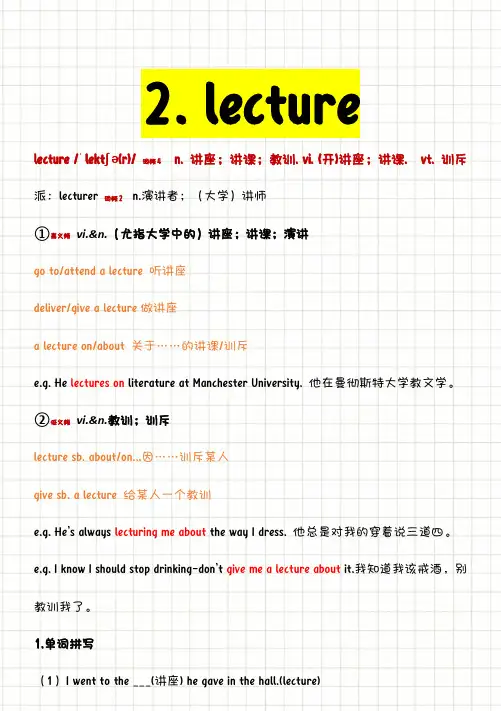
2.lecturelecture /ˈlektʃə(r)/ 词频4n. 讲座;讲课;教训. vi. (开)讲座;讲课. vt. 训斥派:lecturer 词频2 n.演讲者;(大学)讲师①高义频vi.&n.(尤指大学中的)讲座;讲课;演讲go to/attend a lecture 听讲座deliver/give a lecture做讲座a lecture on/about 关于……的讲课/训斥e.g. He lectures on literature at Manchester University. 他在曼彻斯特大学教文学。
②低义频vi.&n.教训;训斥lecture sb. about/on...因……训斥某人give sb. a lecture 给某人一个教训e.g. He’s always lecturing me about the way I dress. 他总是对我的穿着说三道四。
e.g. I know I should stop drinking-don’t give me a lecture about it.我知道我该戒酒,别教训我了。
1.单词拼写(1)I went to the ___(讲座) he gave in the hall.(lecture)(2)He learned a ___(教训)from this thing-he should stop smoking for his health.(lecture)(3)Professor Smith will give a l___ in Fudan University this evening about the history of English.(lecture)(4)She suffered a bad cold. As a result, she missed the ___(讲座) she liked very much.(lecture)(5)She preferred that we should have the discussion right after the ___(讲座).(lecture)(6)Please stop___(lecture) me! I know I should quit smoking.2.语法填空(1)The ___ (lecture) spoke very clearly so that we could hear every word.(lecturer) 3. 完成句子(1)He ___ ___ ___ ___time management to first-year students___ ___ ___ ___.他在报告厅给一年级学生做关于时间管理的讲座。

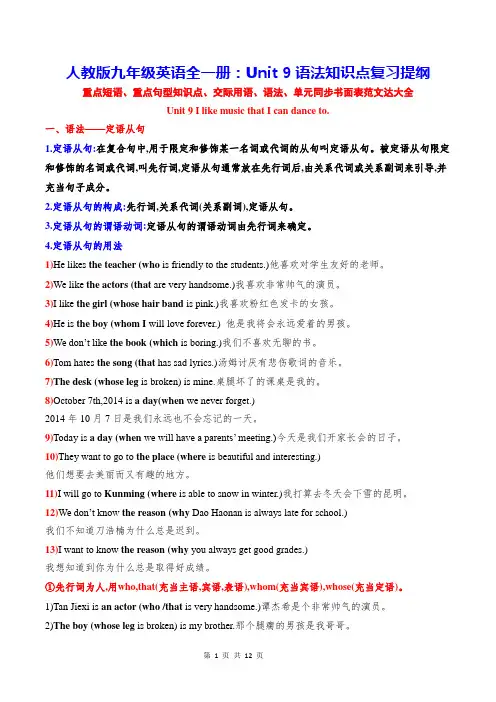
人教版九年级英语全一册:Unit 9语法知识点复习提纲重点短语、重点句型知识点、交际用语、语法、单元同步书面表范文达大全Unit 9 I like music that I can dance to.一、语法——定语从句1.定语从句:在复合句中,用于限定和修饰某一名词或代词的从句叫定语从句。
被定语从句限定和修饰的名词或代词,叫先行词,定语从句通常放在先行词后,由关系代词或关系副词来引导,并充当句子成分。
2.定语从句的构成:先行词,关系代词(关系副词),定语从句。
3.定语从句的谓语动词:定语从句的谓语动词由先行词来确定。
4.定语从句的用法1)He likes the teacher (who is friendly to the students.)他喜欢对学生友好的老师。
2)We like the actors (that are very handsome.)我喜欢非常帅气的演员。
3)I like the girl (whose hair band is pink.)我喜欢粉红色发卡的女孩。
4)He is the boy (whom I will love forever.) 他是我将会永远爱着的男孩。
5)We don’t like the book (which is boring.)我们不喜欢无聊的书。
6)Tom hates the song (that has sad lyrics.)汤姆讨厌有悲伤歌词的音乐。
7)The desk (whose leg is broken) is mine.桌腿坏了的课桌是我的。
8)October 7th,2014 is a day(when we never forget.)2014年10月7日是我们永远也不会忘记的一天。
9)Today is a day (when we will have a parents’ meeting.)今天是我们开家长会的日子。
All sessions take place on both Mondays and Wednesdays (18-1)Week 1-3 (No lessons)Week 4 Introduction to the course: English Grammar (syllabus, teaching plan, description of assessment, self-introduction) / Introduction: Grammatical Hierarchy // Sentence structureWeek 5 Subject-verb Concord (I), (II)Week 6 Noun and noun phrase // Genitive nounWeek 7 (Sports meeting 27th, Oct.)Week 8 Determiners (I), (II)Week 9 Pronoun (I), (II) //Verb and Verb Phrase // Tense and aspect (I), (II)Week 10 Verb and Verb Phrase // Tense and aspect (I), (II)Week 11 Means of expressing future time / Passive voice (I), (II)Week 12 Subjunctive mood / Auxiliaries (I), (II)Week 13 Infinitive (I), (II), / -ing participle, / -ed participleWeek 14 Adjective and adjective phrase / adverb and adverb phrase / Comparison and comparative construction / preposition and prepositonal phraseWeek 15 Statement, question, command, exclamation / Existential sentence / It-pattern / CoordinationWeek 16 Subordination (I), (II) / Relative clause/ conditional sentence / direct and indirect speechWeek 17 Modification / substituion / ellipsisWeek 18 Postponement, fronting and inversion / From sentence to textWeek 19-20 Testing WeeksOutline for each weekWeek 4 Introduction to the course: English Grammar (syllabus, teaching plan, description of assessment, self-introduction) / Introduction: Grammatical Hierarchy // Sentence structure1. Introduction: Grammatical Hierarchy (Introduction Section)Grammar is the structural system of a language. The grammar of the English language is organized into five ranks: the sentence, the clause, the phrase, the word and the morpheme. Each ran is composed of one or more than one grammatical unit of the immediate lower rank. Thus the sentence is a grammatical unit that consists of one or more than one clause; the clause, one or more than onegrammatical unit while the morphem is the minimum or the lowest rank. A full sentence can generally be segmented rank by rank down to its smallest constituents—the morphemes.0.1 MerphemesThe morphese is the minimum or smallest grammatical unit, also the smallest meaningful element of speech. Morpheses fall into two categories: free morphemes and bound morpheses.1) Free morphemes2) Bound morphemes3) Allomorphs0.2 WordsThe word is composed of one or more than one morpheme. Words can be classified in two ways:1) Classification in terms of word-formation2) Classification in terms of grammatical function0.3 PhrasesThe phrase is composed of one or more than one word. Generally, the phrase is a group of word organized in a specific way with a key word as its head. The word class of the head determines the class of the phrase and the way in which the words are organized.1) The noun phrase2) The verb phrase3) The adjective phrase4) The adverb phrase5) The preepositonal phrase0.4 ClausesThe clause is composed of one or more than more phrase. A full-fledged clause is structurally a sequence of phrases and logically a construction of ―subject+ predicate‖.2) Simple and complex clauses3) Main and subordinate clauses4) Finite and non-finite clauses5) Verbless clauses0.5 SentencesThe sentence is the highest rank of grammatical unit. Based on one or more than one clause, the sentence is also the basic linguistic unit of connected discourse; it can stand alone and perform a function in social communication. Thus, a sentence can be defined as a grammatical unit that can stand by its and perform a communicative function.1) Full and minor sentences2) Simple, compound, complex and compound-complex sentences2. Sentence structure (Lecture 1)Owing to the fact that sentences in authentic language differ structurally in thousands of ways, what is described here as sentence structure, sentence elements, or sentence patterns is only concerned with the simple sentence, or rather with the clause.1.1 Clause elementAs has been pointed out before, the clause or the simple sentence is structurally a sequence of phrases and logically a construction of ―subject +predicate‖. That is to say, the clause or the simple sentence is not just an agglomeration of phrase; it is a group of phrases organized into a con struction of ―subject +predicate‖.1) Subject and predicate2) Two ways of sentence analysis1.2 Basic clause types and their transformation and expansionIn terms of the different combinations of clause elements, English clauses can be classified into seven types. Innumberable authentic sentences are structured on the basis of these clause types.1) Basic clause types2) Transformation and expansion of basic clause typesThe basic clause types and their variants can also be expanded levels, and these larger units can again be expanded throughWeek 5 Subject-verb Concord (I), (II)Lecture 2: Subject-verb Concord (I)By subject-verb concord is meant agreement between subject and predicate verb in number.2.1 Guiding principlesThere are three principles guiding subject-verb concord; they are principles of grammatical concord, notional concord and proximity.1) Grammatical concordThe principle of grammatical concord refers to the rule that the verb must match its subject in number. If the subject is plural, the verb should take the plural form; if, on the other hand, the subject is singular or is a mass noun, the verb should take the singular form, eg:Both boys have their own merits.Every girl comes on time.Much effort is wasted.Difficulties arise when this principle comes into conflict with the other two principles: principle of notional concord and principle of proximity.2) Notional concordThe principle of notional concord refers to the rule that the verb can sometimes agree with the subject according to the notion of number rather than to the actual presence of the grammatical marker for that notion, eg:The government have asked the country to decide by a vote.Fifteen miles seems like a long walk to me.3) ProximityThe principle of proximity denotes agreement of the verb with a closely preceding noun phrase in preference to agreement with the head of the noun phrase that functions as subject, eg:Either my brothers or my father is coming.No one except his own supporters agree with him.Neither Julia nor I am going.Note that grammatical concord is the basic principle, but when the subject is realized by a collective noun, a coordinate form or an2.2 Problems of concord with nouns ending in –sThere are quite a few nouns that end in –s but which are not countable. Some of these nouns are treated as singular, some as plural, and some either as singular or as plural. All this can be dealt with under the following headings.1) Disease and game names ending in –sNames of disease ending in –s are mostly treated as singular, but there are a few such names (as measles and rickets) which can be used either as singular or as plural.Game anmes ending in –s are generally used as singular with the exception of cards which is usually treated as plural.2) Subject names ending in –icsNames of subjects ending in –ics are generally singular nouns, but some such nouns are treated as plural when used in other senses than subject names. Compare:Acoustics is the science of sound.The acoustics in the new concert hall are faultless.Economics is a required course for all the students.The economics of the project are still being considered.3) Geographical names ending in –sGeographical names such as the names of archipelagos, mountain ranges, straits and falls are generally used as plural, except for a few treated as singular when used as country names, eg:The Himalayas have a magnificent variety of plant and animal life.The Straits of Gibraltar have not lost their strategic importance.In early January 1976, the Netherlands was hit by its worst storm since 1953.4) Other nouns ending in –sNames for things made of two parts such as scissors, pincers, etc are usually used as plural. But when they are preceded by such unit nouns as a pair of and two pairs of, the number form of the following verb is generally determined by the number marker of the unit noun.Nouns usually taking plural endings such as archives, arms and clothes are generally used as plural with the exception of whereabouts, dramatics, etc which may be treated either as plural or as singular.Nouns ending in –ing such as clippings, diggings, etc are generally used as plural with the exception of tidings which can be used both ways.There are also nouns such as barracks and headquarters whose singular and plural number share the same form. These nouns are2.3 Problems of concord with collective nouns as subjectCollective nouns are singular in form but plural in meaning. The choice between grammatical and notional concord is mostly dictated by usage.1) Collective nouns usually used as pluralThese include people, police, cattle, militia, poultry, vermin, etc.:The Chinese people are a great people.Domestic cattle provide us with milk, beef and hides.2) Collective nouns usually used as singularThese include foliage, machinery, equipment, furniture, merchandise, etc.:All the merchandise has arrived undamaged.All the machinery in the factory is made in China.3) Collective nouns used either as plural or as singularThere are collective nouns that can be used either as plural or as singular. The choice of the verb form following such nouns depends on the exact meaning of the noun in a specific context. When the noun is used in the sense of a collective as a whole, the verb takes the singular form. If, on the other hand, the noun is used in the sense of the individuals that make the collective, the verb takes the plural form. Compare:The anti-crime committee is to make its report tomorrow.The committee are divided in opinion about this problem.That group of soldiers is a top-notch fighting unit.That group of soldiers have the best ratings of individual performance.4) A committee of, etc + plural nounWhen a plural noun is preceded by a committee of / a board of / a panel of, the verb usually takes the singular form, eg.:A committee of finve men and three women is to consider the matter.The board of directors is responsible for the management of the company.Lecture 3: Subject-verb Concord (II)This lecture deals with problems of concord with a coordinate construction, a quantitative expression, or a nominal clause as subject.3.1 Problems of concord with a coordinate subjectThe following rules are to be observed in the case of a coordinate subject.1) Coordination with ―and‖ or ―both … and‖Coordination by ―and‖ or ―both … and‖ is usually treated as plural when it refers to two or more than two persons / things, but it is treated as singular when it refers to only one person or thing. Compare:Both Pauline and Bob have gone fishing on Miramar Lake.Rain, hail and wind have caused an estimated $ 200,000,000 damage to crops and liverstock.The secretary and treasurer was absent from the meeting.Ham and eggs is a good breakfast.2) Coordination with ―or‖ / ―either … or‖, ―nor‖ / ―neither … nor‖, ―not only … but also‖Here the problem of concord is generally deal with according to the principle of proximity. But in informal style, items coordinated by ―neither … nor‖ or ―not only … but also‖ can sometimes be regarded as plural, eg:My sisters or my brother is likely to be at home.Either my father or my brothers are coming.Neither the players nor the coach was / (were) overconfident.Not only the switches but also the old wiring has / (have) been changed.3.2 Problems of concord with expressions of quantity as subjectQuantitative expresssions fall into two categories: definite and indefinite.1) Concond with expression of definite quantity as subject2) Concorn with expression of indefinite quantity as subject3.3 Other problems of subject-vern concordThere are other problems of subject-verb concord that are worth mentioning.1) Problems of concord with a nominal clause as subjectWhen the subject is a nominal clause introduced by what, who, which, how, why, whether, etc, the verb usually takes the singular form. Bu t when two or more such clauses are coordinated by and or both … and, a plural verb is required.2) Subject-verb concord with a non-finite clause as subjectWhen subject is a non-finite clause, the verb of the main clause usually takes the singualr form. But when two or more such clauses are coordinated by and, the verb of the main clause takes the singualr form when the subject refers to one thing, and the plural form when the subect refers to separate things.3) Subject-verb concord in relative clausesIn the construction of ―one of + plural noun + relative clause‖, the principle of grammatical concord is generally observed. Sometimes, especially in British English, in order to lay emphasis on ―one‖, the verb can be also take the singular for m. When ―one”is proceded by ―the‖ or ―the only‖, the verb can only be singular.4) Subject-verb concord in cleft-sentencesIn cleft-sentences, subject-verb concord in that- / who-clause is generally determined by the number of the focal element functioning as subject in the clause. There is one point that should be noted: When the focal element is ―I‖, the verb TO BE in the follo wing who- / that-clause usually agrees whti ―I‖ in both person and number; if, on the other hand, the focal element is ―me‖ instead of ―I‖, the verb TO BE in the following who- / that-clause should take the third person singular number.5) Subject-verb concord in existential sentencesIn existential sentences, subject-verb concord is generally determined by the numb er of the ―notional subject‖, but in informal style, expecially in spoken language, the verb often agrees with the ―formal subject‖ and takes the singular form, even thoug h the notional subject is plural. When the notionaly subject is a coordinate construction, the verb form goes with the first coordinate element of the notional subject, singular or plural.Week 6 Noun and noun phrase // Genitive nounLecture 4 Noun and Noun PhraseAs has been pointed out, the noun phrase is a phrase with a noun as its head. It is the noun head that determines the way the noun phrase is organized.4.1 Classification of nouns and function of noun phrases1) Classification of nounsNouns can be classified according to word formation, lexical meaning and grammatical form.a) Simple, compound and derivative nounsAccording to word formation, nouns can be divided into simple, compound and derivative nouns. A simple noun is a noun that contains only one free morpheme (e.g. man, chair, land, faith). A compound noun is a noun that is composed of two or more morphemes (mostly free morphemes) (eg: armchair, farmland, seaside, roommate). A derivative noun is a noun that comes from a verb, an adjective or a simple noun with affix (prefix, or suffix, eg.: arrangement, greatness, patriotism, forget-me-not).b) Proper and common nounsAccording to lexical meaning, nouns fall into two major categories: proper nouns and common nouns. A proper noun is a name used for a particular person, place or thing, and spelt with a capital initial letter (eg: Anderson, Britain, The New York Times). A common noun is a name common to a class of people, things or abstract ideas. Common nouns can be further classified into individual, collective, material, and abstract nouns (eg: boy, tiger, family, team, water, air, honesty, glory).c) Count and noncount nounsAccording to grammatical form, noun can be divided into two classes: count nouns and noncount nouns. A count noun (or countable noun) is a noun that has a plural and which can collocate with numbers and with such determiners as a(No, many, few, these, those, several. etc. (eg: a car, two cars, many cars, several cars). A noncount noun (or uncountable noun) is a noun that cannot go with the above-mentioned words (eg: bread, furniture, merchandise).2) Function of noun phrasesThe noun phrase can function as all the elements in a sentence except the predicate verb:Children at play seldom remember what time it is. (Subject)That was an attractive little black chair. (Subject complement)In the hall I saw some extremely valuable pictures. (object)They elected him chairman of the board. (object complement)Mr Brown, director of the coal mine, should be responsible for the accident. (appositive)Teachers should be concerned about the students’ moral culture. (prepositional complementation)He returned last night. (adverbial)A photo is taken each time this button is pushed. (conjunction)(Keys to 4A: 1. description 2.arrangement 3.attendance 4.peculiarity 5.expectation 6.argument 7.dependence 8.originality 9.exaggeration 10.measurement 11.purity 12.persistence 13.extension 14.statement 15.generosity 16.entrance 17.loneliness 18.forgetfulness 19.happiness 20.seriousness)4.2 Number forms of nounsNumber is a grammatical distinction which determines whether a noun or determiner is singular or plural.1) Regular and irregular pluralIndividual nouns are all countable and therefore have singular and plural forms. The singular form of an individual noun, which shares the same form as the base of the word, can take such determiners as a(n) and one (eg: a/ one desk, an / one article).The plural form of an individual noun can be regular or irregular. The regular plural is formed by adding –s or –es tho the base,ending of the noun (eg: tooth—teeth, man—men, mouse—mice, child—children, ox—oxen).irregular plurals also include some words of foreign origin, borrowed from Greek, Latin or French. The plural forms of these borrowed words are known as ―foreign plurals‖, eg:basis—bases, criterion—criteria, stratum—strata, alumnus—alumniSome borrowed words have two plural forms: a foreign plural and an English plural, eg:medium—media—mediumsindex—indices—indexesformula—formulae—formulascurriculum—curricula—curriculumsFor some nouns, their singular and plural number share the same form, eg:A deer—ten dear, one fish—several fish, a Japanese—a group of Japanese, an aircraft—a hundred aircraft2) Number forms of the collective, material, abstract and proper nouna) Number forms of the collective nounSome collective nouns are countable, some are not. Countable collective nouns behave just like individual nouns. An uncountable collective noun has no plural form. If we want to count the number, we will have to use a kind of individual noun related semantically to the collective (eg: a piece of furniture, two articles of equipment)b) Number forms of the material nounMaterial nouns are generally uncountable and have no plural forms. But there are some such items that cen be used either uncountably or countably. When used to mean the material itself, they are uncountable, but when used in other senses, for example, two coffees in the sense of ― two cupfuls of coffee‖, they are countable, behaving just like individual nouns.. There are als o material nouns that can take plural endings, for example, sands/w aters in the sense of ―large expanse of sand or water‖ and foods/fruits in the sense of ―a variety of food or fruit‖; these nouns, though ending in –s, remain uncountable.c) Number forms of the abstract nounAbstr5act nouns are mostly uncountable. They cannot take such determiners as a(n)/ one or plural forms. But there are a few abstract nouns (eg: a victory—two victories) that are countable like individual nouns. There are also abstract nouns that have plural endings but which are uncountbale.In the case of some abstract nouns, the mere addition of a plural ending has the effect of changing the meaning of the base.We meet once a year to exchange our teaching experience. (经验)We told each other our experiences in foreign countries.(经历)d) Number forms of the proper nounProper nouns are unique reference and therefore have no plural forms, except for such proper names as the United States, the Philipines, the Netherlands, etc which are themselves plural in form. When a proper noun takes a plural endings, it takes on some characteristics of a common noun, eg:Have you invited the Browns?There are two Miss Smiths/Misses Smith in our class.4.3 PartitivesPartitives, also called unit nouns, are commonly used to denote a part of a whole or the quantity of an undifferentiated mass. Both count and noncount nouns can enter partitive constructions. With plural count nouns, partitive constructions can denote the idea of ―a group‖, ―a pack‖, etc. With noncount nouns, such constructions can achieve countability. Partitives fall into the following categories:1) General partitives2) Partitives related to the shape of things3) Partitives related to volume4) Partitives related the state of action5) Partitives denoting pairs, groups, flocks, etc.Week 7 (Sports meeting, 27th, Oct. Friday)Week 8 Determiners (I), (II) // Pronoun (I), (II)Lecture 6Determiner (I)Words that precede any premodifying adjectives in a noun phrase and which denote such referential meanings as specific reference, generic reference, definite quantity or indefinite quantity are referred to as determiners.Determiners, as a class of words, include: articles (definite article, indefinite article, zero article), possessive determiners, genitive nouns, demonstrative determiners, relative determiners, interrogative determiners, indefinite determiners, cardinal and ordinal numerals, fractional and multiplicative numerals, and other quantifiers.The head of a noun phrase limits the choice of determiners, and when more than one determiner occurs in the noun phrase, there is the problem of word order between determiners.6.1 Collocations between determiners and nounsThe choice of determiners is closely related to what might be called the three classes of nouns: singular count nouns, plural count2) Determiners with singular count nouns only3) Determiners with plural count nouns only4) Determiners with noncount nouns only5) Determiners with singulars and plural count nouns only6) Determiners with singular and noncount nouns only7) Determiners with plural and noncount nouns only6.2 Collocations between determinersAs has been mentioned before, besides the collocations between determiners and nouns, there is the problem of word order between determiners if a noun phrase contains more than one determiner.1) Central determiners, predeterminers and postdeterminersAccording to their potential position, determiners fall into three subclasses: central determiners, predeterminers and postdeterminers.2) Word order of three subclasses of determinersWhen a noun phrase contains all three subclas ses of determiners, their normal order is ―predeterminer + central determiner + postdeterminer(s)‖:All the four studentsAll these last few daysBoth his two sisters6.3 A comparative study of some determiner usage1)many, much, a lot of, lots of, plenty of2)(a) few, (a) little3)some, any4)all, both, every, each, either, either, neither, anyII. Lecture 7Determiners (II) ArticlesEnglish has two articles: the definite and the indefinite article. As we know, all English common nouns have article contrast, so with plural count nouns and noncount nouns, the absence of an article signals the presence of another kind of article—the zero article. It is in this sense that we may also say that English has three articles—the definite, the indefinite, and the zero article.7.1 Generic and specific referenceIn discussing the use of articles, we must distinguish between generic and specific reference.1) Generic referenceWhen we say the reference is generic, we are talking about any member representative of a class of people or things. All the three forms of article (the, a(n), and zero) can be used generically to refer to the member of a class as a whole.2) Specific referenceSpecific reference is different from generic reference in that it does not refer to a class of people or things in general but to a particular specimen of the class. Specific reference falls into two kinds: definite specific reference and indefinite specific reference.3) Anaphoric, cataphoric and situational referenceDefinite specific reference can be anaphoric, cataphoric, or situa tional. The word anaphoric means ―pointing backward‖. When what is referred to occurs in a previous context and the definite article has to point backward for its meaning, this is known as ―anaphoric reference‖. The anaphoric use of the definite article is called ―anaphoric THE‖. Eg.He ordered a book some time ago. The book has now arrived.His car struck a tree; you can still see the mark on the tree.Catephoric reference is also a kind of definite specific reference. The word cataphoric means ―pointing forward‖. When the referential meaning of the definite article is determined by what follows the article and the head, and the article has to point forward for its own interpretation, that is cataphoric reference. The cataphoric use of the definite artic le is called ―cataphoric THE‖. Eg.Is this the train for Shanghai?This is the place where I first met her.Situational reference is a kind of definite specific reference that depends not on any referent that has occurred in the context but solely on the common knowledge shared by speaker and hearer or on a specific situation in which the reference is made clear. Situational reference is most commonly denoted by the definite article, but in certain situations the same function can also be performed by zero. Eg.What’s on the radio?How’s the cough today?Shut the door, please.common nouns, but also because there are too many exceptions to the rules guiding the use of articles. As a matter of fact, the choice of an article in quite a few idiomatic expressions is just a matter of usage which is difficult or even impossible to explain in terms of a few grammatical rules. The following is a brief description of the use of articles with different classes of noun.1) article in use with proper noun2) article in use with common noun3) other uses of articlesWeek 9 Pronoun (I), (II)Lecture 8Pronouns (I)Pronouns are a varied closed-calss words with nominal function. English has a developed pronoun system, comprising personal pronouns, possessive pronouns, reflective pronouns, reciprocal pronouns, demonstrative pronouns, interrogative pronouns, relative pronouns, and indefinite pronouns. The present lecture will deal with the concord of pronouns (and corresponding determiners) with their antecedents in number, gender and person.8.1 Pronoun concord in numberPersonal pronouns, possessive pronouns, reflective pronouns, and corresponding determiners have their singular and plural forms. The number contrast of pronouns differs from that of nouns in that pronoun number contrast is morphologically unrelated, as in I / we, he /they, as opposed to the typical regular formation of noun plurals: boy / boys.The choice of pronoun number forms is generally determined by the number of its antecedent, that is to say, a pronoun must agree with its antecedent in number. Here are a few points that merit our attention.1) Pronoun concord with every-, some-, any- compounds as antecedentWhen the antecedent is compound such as everyone, everybody, someone, somebody, anyone, anybody, no one, nobody, the pronoun and the corresponding determiner usually follow the principle of grammatical concord and take the singular form. But in informal style, they can follow the principle of notional concord and take the plural form, esp. when the antecedent is everybody or everyone. Note that with everything, something, anything and nothing, the pronoun and corresponding determiner can only take the singular form.Anybody can attend the meeting if he is interested.Everybody talked at the top of his voice.Everyone was clapping their hands.Anything on the table can be thrown away, can’t it?。
lecture的用法和搭配解析一、lecture的基本含义在英语中,lecture有两个主要的含义,分别是:讲座,讲课,演讲。
这是lecture的名词用法,指的是教育性或学术性的口头讲授,通常由专家或教师进行,目的是传授知识或观点。
例如:He gave a lecture on the history of art. 他做了一场关于艺术史的演讲。
I attended a lecture by a famous writer. 我参加了一位著名作家的讲座。
She is a professor who lectures on economics. 她是一位讲授经济学的教授。
教训,告诫,训斥。
这是lecture的动词用法,指的是长时间或严厉地责备或劝告某人,通常出于不满或关心。
例如:My parents lectured me for staying out late. 我的父母因为我晚归而教训了我一顿。
He lectured her on the importance of honesty. 他告诫她诚实的重要性。
She lectured him about his bad habits. 她训斥他的坏习惯。
二、lecture的词性和用法lecture可以用作名词或动词,具体的用法如下:lecture作为名词,是可数名词,其后可以接介词on或about,表示讲座或演讲的主题。
例如:He delivered a lecture on environmental protection. 他发表了一场关于环境保护的演讲。
She attended a lecture about Chinese culture. 她参加了一场关于中国文化的讲座。
lecture作为动词,可以是及物动词或不及物动词,具体的用法如下:lecture作为及物动词,表示向某人讲授,讲课,演讲,或者教训,告诫,训斥某人。
其后可以接名词或代词作宾语。
九年级英语Unit 9知识点与语法精讲精练词汇梳理(一)完成单词梳理:名词:1. lyrics歌词 2. director 导演;部门 3. war 战争;战争状态4. case 情况;实情5. drama 戏;剧6. ending 结尾;结局7. documentary 纪录片8. dialog 对话;对白9. superhero 超级英雄10. sadness 悲伤;悲痛11. pain 痛苦;疼痛;苦恼12. lifetime 一生;有生之年动词:1. prefer 更喜欢 2. suppose 推断;料想 3. stick 粘贴;将……刺入4. shut 关闭;关上5. reflect 反映;映出6. perform 表演;执行7. recall 回忆起;回想起代词:1. plenty 大量;众多形容词:1. electronic 电子的;电子设备的 2. smooth 悦耳的;平滑的3. down 悲哀;沮丧4. intelligent 有才智的;聪明的5. moving 动人的;令人感动的6. painful 令人痛苦的;令人疼痛的兼类词:1. Australian (adj)澳大利亚(人)的(n)澳大利亚人2. spare (adj)空闲的;不用的(v)抽出;留出3. sense (v)感觉到;意识到(n)感觉;意识4. pity (n)遗憾;怜悯(v)同情;怜悯5. total (n)总数;合计(adj)总的;全体的6. master (n)大师;能手;主人(v)掌握7. praise (v/n)表扬;赞扬8. wound (n)伤;伤口;创伤(v)使(身体)受伤;伤害(二) 词汇变形小结:1. Australia (n. 澳大利亚) — Australian (adj/n澳大利亚的)2. electronic(adj. 电子的) — electricity (n. 电;电能)3. smooth (adj. 平滑的) — smoothly (adv. 平稳地;平滑地)4. direct (v. 指导) — director (n. 导演;部门负责人)5. stick (v. 粘贴;将……刺入)— stuck (过去式) — stuck (过去分词)6. end (v. 结束) — ending (n. 结尾;结局)7. shut(v. 关闭;关上) — shut (过去式) — shut (过去分词)8. intelligent(adj. 有才智的;聪明的) — intelligence (n. 智力;才智)9. sadness(n. 悲伤) — sad (adj. 悲哀的;难过的) — sadly (adv. 伤心地)10. pain(n. 疼痛) — painful (adj. 令人痛苦的;令人疼痛的)11. reflect(v. 反映;映出) — reflection (n. 映像;反映)12. move(v. 使感动;打动) — moving (adj. 动人的;令人感动的) — moved (adj. 感动的)13. perform(v. 表演) — performance (n. 演出) — performer (n. 表演者)14. total(adj. 总的;总体的) — totally (adv. 全部地)【练一练】用所给词的适当形式填空1.You must be active to share your happiness and ___sadness_____with others.(sad)2.The spaceship traveled ___smoothly____ (smooth) in the universe.3.Xuzheng is not only an actor,but also a successful ___director____ (direct).4.Going to the dentist is a ___painful_____(pain) experience for most people.5.Lily, an ___Australian____(Australia) girl, came to China three years ago.st night, my mother told me a ____moving_____(move) story.7.I like stories which have happy___endings______(end).8.___Electronic___(electricity) products are now widely used all over the world.9.There is no general agreement on standard definition(定义)of ___intelligence___ (intelligent).10.He often plays soccer with his friends instead of ___playing_______ (play) puter games at home.(三) 短语攻关: in that case 既然那样;假使那样的话 stick to 坚持;固守 plenty of大量;充足 shut off 关闭;停止运转 once in a while偶尔地;间或 in total 总共;合计 dance to 随着……跳舞 electronic music 电子音乐sing along with 跟着……一起唱 depend on 由……决定;取决于 in time及时 spare time 空闲时间 in this way用这种方式 think about 思考;考虑1.I prefer music that has great lyrics. 我更喜欢歌词优美的音乐。
综合英语教程第三版第⼆册Unit9课⽂重要词组单词Unit 9Language points1.to run into(1) to meet [sb / weather-usu.bad]1) Guess who I ran into in the High Street this afternoon?2) I hope that the climbers don’t run into a snowstorm halfway up.3) We were sailing along nicely until we ran into a patch of mist just off the shore. (2) to (cause to) meet (difficulties, debt, ect.)1) Our plan ran into unexpected opposition.2) Taking risks like that might run the firm into debt.(3) add up toThe national debt runs into eight figures(4) to (cause to) hitI ran into the gatepost and hurt my knee.2. despite —in spite of: (to noun phrase)(1) He came to the meeting despite his serious illness(2) Despite mistakes and weaknesses, it did a great deal of good work inside the trade union.3. threaten to do sth —to announce to do sth to harm sb.to threaten to murder sb.threaten with: If you threaten the prisoner with severe pain he might admit his guilt.⽤刑威胁罪犯他可能会认罪的。